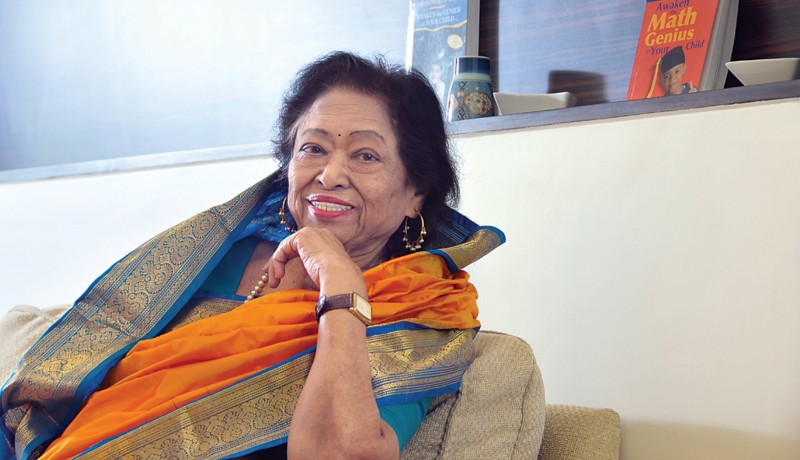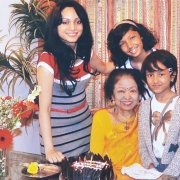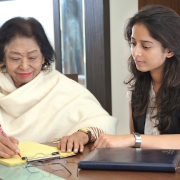
People

Shakuntala Devi bewildered and puzzled the world with her gift for numbers. In an exclusive interview to Harmony-Celebrate Age, given a couple of months before her demise, she revealed her lesser known side to Srirekha Pillai
“Number nine is the most powerful number in the universe. Nine represents attainment, satisfaction and accomplishment. As the highest number, nine marks the completion of all that was started by the numbers that came before and the mastery of all the challenges faced by numbers that precede it. Nine also represents highly developed intuition and spirituality. It beseeches you to recognise your internal attributes and make a positive difference to the world. We also have the navaratna, navagraha and navarasa.”
It wouldn’t be wrong to say that numbers chose her. Right from the age of three, when she filled in for her father at a local circus, to her demise on 21 April 2013 at 83, Shakuntala Devi’s life was a smorgasbord of mathematical equations, logarithms and square roots. She would ‘simply’ add a 16-digit number to another, multiply the result with an equally ferocious array of numbers, find the cube root of the resultant number and come up with the accurate answer, all in the time taken by ordinary mortals to wink!
It’s this numerological advantage that took a young Devi from Bangalore across the seas—prestigious universities, reputed television shows, even an audience with eminent physicist Albert Einstein. Einstein set her a complicated mathematical problem involving a whole set of algorithms, least expecting an answer in less than three hours because that is what it would have taken him, by his own admission, to solve it. But here she was, ready as ever, with the right answer instantaneously. Devi’s intuitive understanding of numbers left Einstein speechless, as also an august gathering of learned mathematicians many years later at a university overseas in 1977, when she extracted the 23rd root of a 201-digit number in just 50 seconds.
Pitting her grey cells against the most complexly constituted superchips, Devi triumphed every single time, earning the moniker Human Computer and a mention in The Guinness Book of World Records. When she appeared on a BBC show, her answer to a difficult question was different from the interviewer’s. Much to the BBC’s embarrassment and consternation, it turned out Devi was right. Her marathon of public performances that started with a show at the University of Mysore at the age of six took her to schools in Karnataka and Mumbai. Carol Lobo, a former student of Apostolic Carmel High School in Mumbai, recalls being wonderstruck at Devi’s ability, “When we were told we had to assemble in the main hall of the school to meet Shakuntala Devi, none of us knew who she was. But when she started throwing up answers to the most complex mathematical equations in just seconds, we were dumbfounded. What she had was a God-given gift.”
It is precisely this God-given gift that kept the fire burning in her kitchen; she was pushed to give public performances by her parents. Unfortunately, Devi’s inherent and intuitive skills with numbers were reduced to providing ‘numero-astrological’ solutions in the latter part of her life. Our interview at her apartment in Mumbai was interrupted intermittently by phone calls and the ringing of the door bell, people seeking an audience with her for quick fixes to mend bad relationships, finding better jobs, monetary gains and happiness. The living room, serving as a waiting room for clients, proudly displayed a framed photograph of her with Shah Rukh Khan and a shelf stacked with books authored by her, including Mathability: Awaken the Math Genius in Your Child, Puzzles to Puzzle You and In the Wonderland of Numbers, among others. It speaks volumes about Devi that, despite the growing line of consultation, not once did she get restless, posing patiently for our photo shoot. None of us knew then that it would be her last photo shoot and interview to the media. Two months later, curtains came down on a life that was a reminder of the infinite possibilities of the human brain.
EXCERPTS FROM THE INTERVIEW
From a toddler aged three, you have literally grown up with numbers. What do they mean to you?
Life is all about numbers; they are all around us. Numbers are there in your date of birth, time and year; in the calories of energy you draw from the food you eat; in the number of times your heart beats. Numbers are an integral part of our lives.
Is there any switch on or switch off time for you when it comes to numbers?
Not at all. Numbers constantly buzz in my head. While I’m on the road, I read the registration numbers of other vehicles and try adding them up to see if the result is a prime number or not. Even when I’m pottering around the kitchen, the measurement of ingredients transforms into numbers in my head.
You have published a cookery book, Cookery Book for Men: And Other Beginners. How much of a foodie are you?
My book has basic recipes easy for a beginner to rustle up. I’m a frugal eater. My breakfast is idli or upma and lunch is ragi mudde [a Kannada staple] and sambar. I don’t particularly enjoy eating out. So, wherever I am, I try to have home-cooked food as much as I can.
Tell us about the early years.
I was born into a poor Brahmin family. My mother was only 14 when she married my father, who was 60. Of the eight siblings, I was the eldest. Only rich Brahmin families sent kids to school those days. Children just grew up like that, with daughters learning household chores and getting married, and sons learning priestly duties. My father decided to go against the grain and became a lion tamer and ‘human cannonball’ in a circus troupe. He also used to do card tricks, memorising the entire sequence of a deck. Once, he was unable to perform and asked me to step in. I was about three at that time. Soon, my shows became the highlight of the circus and gradually I started travelling to schools, colleges and universities to perform. By the time I was five, I was the family’s sole breadwinner. I used to travel to schools in Karnataka and Mumbai. In Mumbai, I used to make ₹ 30 a day, which was a princely amount those days.
Do you regret not having a normal childhood?
I have seen tough times. Whatever my father earned in the circus was hardly enough to make ends meet. When my parents discovered I had a way with numbers, they started sending me to schools for shows. I didn’t want to do those shows, travelling all over. When I refused, my father would beat up my mother and she in turn would beat me up.
Did you miss going to school?
I was admitted to St. Theresa’s Convent in Bangalore but was expelled after a month because my parents could not afford the monthly fee of ₹ 2. A few years ago, the school management approached me, asking me to participate in the alumni function. I refused point blank.
You are a prolific writer. How did you educate yourself?
I have always enjoyed reading. I’m a self-taught reader. I began with simple stories, slowly graduating to poetry and serious reading. I read all kinds of books. I enjoy reading Somerset Maugham, Shakespeare and T S Eliot, who is my favourite author. When I was hunting for a property in England, I came across a house that belonged to him. I bought it and stayed there for a while. I have antique furniture which belonged to Eliot at my Bengaluru house.
You wrote a book on homosexuals, The World of Homosexuals, in 1977. How did that come about?
While I was in Canada, I met these bright young boys who invited me to their house one day. They served such an amazing meal that I told them, “You don’t need to marry. You cook exceptionally well.” They laughed and told me that they were married to each other. I was taken aback, because I had no idea about homosexuality then. Later, when I came back to India, I wrote an article on it. A publisher happened to come across it and commissioned me to write a book. Those were still the early days when people in India didn’t speak about it.
You are constantly sought out by celebrities for numerological solutions. Is there any interesting encounter you would like to share?
I’m sorry, I can’t reveal my clients. But, yes, during my travel once, I saw this gentleman at the airport checking in with a huge sitar. I walked up to him and asked him whether he played sitar. I also told him I was a great fan of Pandit Ravi Shankar. Later, I found him seated next to me in the flight. After a while, I dozed off. Suddenly, in a semi-conscious state I realised the gentleman was none other than Panditji. I squealed, “You are Pandit Ravi Shankar!” Panditji just smiled. I shared with him my love for musical instruments, particularly the sitar and the flute, which I play rather well. A few days later, his wife Sukanya called up to say that he had told her how he had bumped into Shakuntala Devi and that she almost didn’t recognise him.
What is your recollection of Albert Einstein?
He was sick and ailing when I met him. He set me a mathematical problem and when I gave him the correct answer, he was amazed. He told me, “Keep believing in numbers. They’ll help you along the way.”
Would you agree that we are losing out on our mathematical abilities because of our dependence on machines for calculations?
We hardly use our brain to its fullest potential. Just the way muscles become atrophic if not utilised properly, the brain shrinks if not used optimally. There is this young boy in a furniture shop I frequent in Bengaluru. He used to flick out his calculator to do simple math with two-digit numbers. I scolded him one day. Now, he’s wary of me and keeps his calculator locked away in my presence.
What is the connection between math puzzles and keeping Alzheimer’s at bay?
Just like the body needs exercise to keep it going, the brain needs exercise as well. Calculations exercise the brain. The more you use your brain, the sharper it stays. Solving puzzles is one way of keeping your brain active.
You practice numero-astrology, offering solutions based on numerology. What is the connection between math and astrology?
Astrology is nothing but calculations, based on the position of planets, the time and date of birth. My grandfather was a well-known astrologer, and I am the seventh generation astrologer in my family.
Not much is known about your family.
I was married to an IAS officer from Kolkata, Paritosh Bannerji, who is no more. We separated long back. I have a daughter, Anupama, who is happily married and settled in Bengaluru and is a mother to two lovely daughters.
You’ve opened your own varsity in Bengaluru, the Shakuntala Devi International Institute of Management Sciences and Pre University. What does it aim to do?
I find that most schools today teach computers and software. But we have moved away from our roots. My university delves into the secrets of Vedic Mathematics and makes learning math an enjoyable experience.
On a parting note, how do you think the gift of numbers happened to you?
[Thinks for a while … smiles] In my childhood, I lived in Tiruchirapalli, which has a famous Ganesha temple. One day I decided to make that Ganesha my friend. He has shown the way.
NUMBERQUEEN
- In January 1977 at Southern Methodist University in Dallas, Shakuntala Devi extracted the 23rd root of a 201-digit number in 50 seconds. It took a UNIVAC 1108 computer (one of the fastest supercomputers ever created) 62 seconds to confirm that she was right after it was fed with 13,000 instructions!
- On 18 June 1980, she was asked to multiply two 13-digit numbers: 7,686,369,774,870 and 2,465,099,745,779, picked randomly by the Computer Department of Imperial College, London. She gave the correct answer, 18,947,668,177,995,4 26,462,773,730, in a mere 28 seconds!
Photos: Vilas Kalgutker Featured in Harmony — Celebrate Age Magazine June 2013
you may also like to read
-
For the love of Sanskrit
During her 60s, if you had told Sushila A that she would be securing a doctorate in Sanskrit in the….
-
Style sensation
Meet Instagram star Moon Lin Cocking a snook at ageism, this nonagenarian Taiwanese woman is slaying street fashion like….
-
Beauty and her beast
Meet Instagram star Linda Rodin Most beauty and style influencers on Instagram hope to launch their beauty line someday…..
-
Cooking up a storm!
Meet Instagram star Shanthi Ramachandran In today’s web-fuelled world, you can now get recipes for your favourite dishes at….









